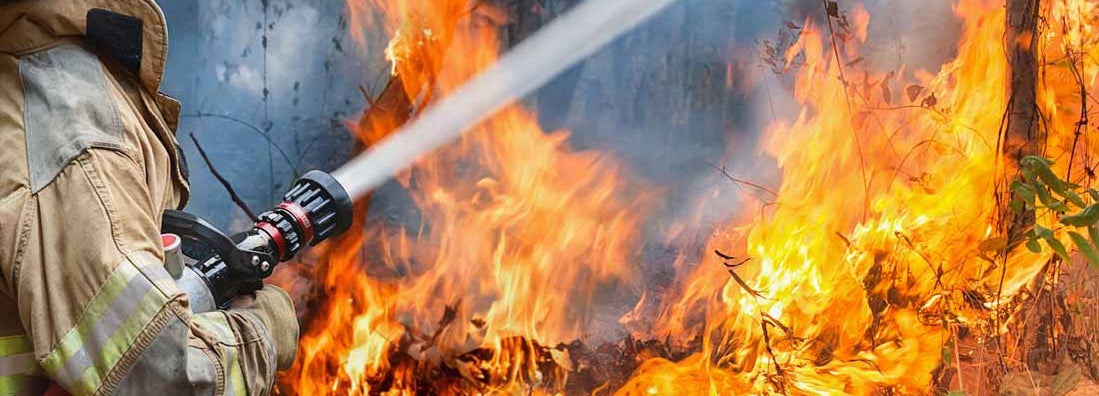Indiana Fire Insurance
Find the right fire insurance policy for you.

The causes of fires here in the Hoosier state vary from malfunctioning electrical equipment to campfires and fireworks that start raging wildfires during the hot dry summer season. But cooking incidents are the leading cause of fires, overall. A fire that burns out of control can quickly destroy everything you own, including your home, personal possessions, and even your car and recreational vehicles.
Indiana fire insurance should be built into your home or renters policy as well as the comprehensive portion of your vehicle policies. The challenge occurs if you do not have these coverage plans in place, or if your insurance is not adequate. If you are seeking Indiana fire insurance quotes and coverage plans, contact an independent insurance agent in our network. A local member agent can help you compare fire coverage options and protect your home and valuable possessions.
- Approximately 374,000 residential fires occur each year in the U.S.
- These fires result in more than $7 billion in property losses annually
- Cooking and home-heating cause about 72% of all residential fires
What Do I Need To Know About Fire Insurance?
Although fire is covered under most policies, including your homeowner’s, renters, car and RV policies, your coverage may not be sufficient. Here are some considerations as you research Indiana fire insurance and determine how much coverage you need:
Valuables: You will typically need additional coverage for valuable possessions such as art, collectibles, paintings and other high-value items. To make certain these items are fully covered, you may need to add additional endorsements, also called “riders,” to your homeowners insurance. You may need to have these items appraised before the insurer will cover them.
Replacement value vs. actual cash value: A replacement value homeowners policy will cover the cost of rebuilding or repairing your home and restoring your personal belongings back to their state before a fire. Actual cash value will only provide a depreciated amount of compensation on your home and belongings if you need to file a fire insurance claim.
Coverage limits: Every policy has a coverage limit. This includes coverage on your home, vehicles, boat and personal belongings. Be sure you review your coverage limits to determine if they are appropriate. As an example, if you remodel your home, but your limits are set at the home’s value before the remodel, you may not get full compensation after a fire.
Exclusions: Policies also have exclusions and limitations. Read these carefully and make sure you comply to avoid the risk of having a claim denied. As an example, if a home fire is caused by neglect, your loss will most likely not be covered. Important steps you can take include cleaning lint traps, maintaining your electrical systems, never leaving a stove unattended, and making sure you have installed, functioning smoke alarms.
Comprehensive coverage: Be sure to manage your risk of fire damage regarding your vehicles and the outdoor “toys” that are popular here in Indiana, to make sure you can successfully file a fire insurance claim. For example, if you own an ATV, snowmobile, boat or PWC, consider purchasing comprehensive coverage on each of these items. Many of these vehicles have only a minimum liability requirement, or do not require insurance at all. Without comprehensive coverage, you will not receive compensation if they are destroyed by fire.
If you are not happy with your insurance plans or are not sure they are adequate, consider speaking with a local independent agent about finding a better plan.
Preparing for a Fire Insurance Claim
If you ever must file a fire insurance claim on your Indiana home, boat or vehicle, you will need to have adequate coverage in each of these individual policies. A great way to start is to estimate the value of your home and possessions. For the belongings within your home, it is a good idea to take an inventory of everything you own, and keep track of receipts and other documentation that can vouch for the value of those items.
Consider how much it would cost to replace these items if they were destroyed by a fire on today’s market. This will give you a rough estimate of how much insurance coverage you will need for your possessions. One strategy is to take pictures or videos of your possessions, and store these along with your receipts in a fire-proof safe or location outside of your residence. Keeping this information safe in a fire will help you if you need to make a claim on your Indiana fire insurance.
Can a Fire Claim Be Denied?
As with nearly every type of insurance, there are certain conditions where an insurer may deny your fire insurance claim. The most common reasons include:
- The claimant refused or neglected to contact the fire department to report the fire
- The residence lacked smoke detectors, fire extinguishers, or other equipment used to prevent a fire
- The owner or occupant caused the fire through gross negligence
Take all possible precautions to prevent fire and maintain your home and vehicles to ensure that you can successfully file a claim when the time comes.
Where Can I Find Fire Insurance?
To compare Indiana fire insurance quotes and options, find an independent insurance agent in our network, right in your neighborhood. One of these agents will be able to fully assess your risks and insurance needs, not only regarding your home and belongings, but your vehicles and recreational toys as well. Your agent can access many different insurance companies and help you find the best fit for your circumstances. Additionally, your agent can look for opportunities to combine policies and find discounts.
Contact a local member agent today so you are prepared in the event of a fire.
